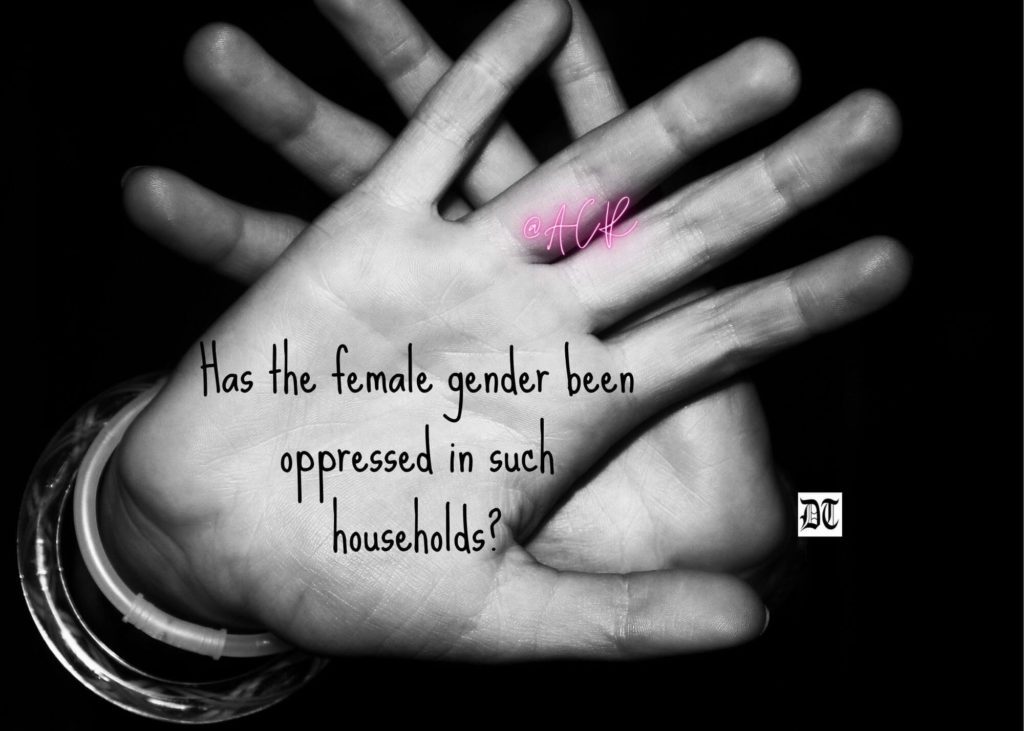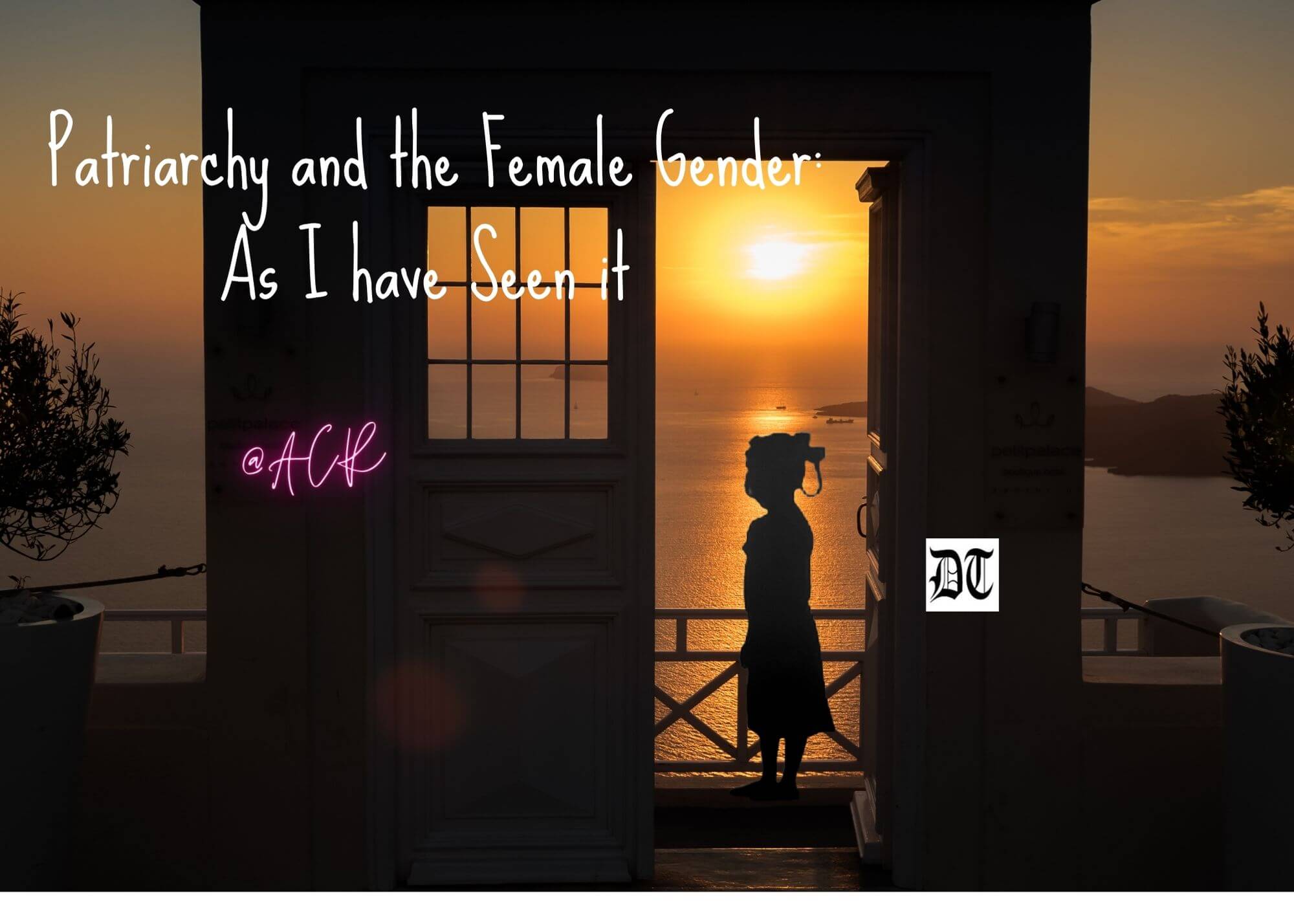As a small girl, at her home, Lopamudra came face-to-face with patriarchy, red in tooth and claw. She reveals the stranglehold of male domination in a Bengali Brahmin family, at Kolkata, exclusively for Different Truths.
“Each time a woman stands up for herself without knowing it, possibly without claiming it, she stands up for all women.” ~ Maya Angelou
As a little girl fighting with the demons of early puberty in the late 1980s, my first tryst with my own intimate world, shaped by the patriarchal construct happened one fine August day like a rude jolt, shaking me from my girlhood reveries.
“Your elder cousin sister, in her college, had been quite a rebellious one, you see. She used to mingle with many boys of all religions and castes and of all backgrounds, quite indiscriminately. One summer evening, quite a decade ago, she had been to the cinema with this unruly herd of friends, and the news reached her father as quickly as a wildfire.”
As that uninitiated twelve-year-old, the onus was on me to understand, rather internalise the Bhattacharya family tree, the quirks, preferences, socio-cultural identity of my ancestors.

As much as I remember now, it was close to my twelfth birthday, and there was a school project that required us to make an elaborate family tree, an initiation that would lead to revelations and pride in chronicling one’s roots. As that uninitiated twelve-year-old, the onus was on me to understand, rather internalise the Bhattacharya family tree, the quirks, preferences, socio-cultural identity of my ancestors. However, the first aspect that struck me in that journey was the cultural conditioning of the women in our family. Much later in life, I learnt to spell and know the full significance of the word ‘patriarchy.’
“And then, he got so furious with her the moment she returned home, he threw at her the aluminum bucket with which he was having his evening bath.”
“Oh dear! Wasn’t she hurt? How did she deal with it?”
“She was hurt, yes. In fact, she has that scar till today, a reminder of how her father, your elder uncle would be instigated to react once she dared to cross her boundary line.”
Yes, the boundary line was etched out for me too, in this memory of woman to girl conversation, one of the many random numbers of chit-chats that happened between me and my mother in our suburban home…
Yes, the boundary line was etched out for me too, in this memory of woman to girl conversation, one of the many random numbers of chit-chats that happened between me and my mother in our suburban home, in West Bengal. In her conversations in which she shared little anecdotes on her in-law’s family, our ancestral home in the same suburban town, I would hear, time and again, the sound of a door opening up bit by bit in front of my maiden eyes, leading to various nuanced understandings of gender roles, gender discrimination, and the choices that women in my familial periphery would or would not make, not without their repercussions.
After more than two decades of this revelation, resting my body and conscience in foreign soil, I have tried to decode the legacy of my family, noting down its bare particulars.
A middle-class Bengali Brahmin household, with a stern reputation for being casteist, cornering women in the name of well-nourished, unexplained family traditions.
Inter-caste marriage of a daughter could lead to being ostracised for years altogether, only to be reunited with the family after a male offspring had been born.
Inter-caste marriage of a daughter could lead to being ostracised for years altogether, only to be reunited with the family after a male offspring had been born. Inter-religion marriage was inconceivable, and if it happened, it would only result in banishment.
Widows, both young and old would absolutely have to live a life of rituals and celibacy, be on a strictly vegetarian diet and remain within closed doors during any auspicious family occasion.
Widows, both young and old would absolutely have to live a life of rituals and celibacy, be on a strictly vegetarian diet and remain within closed doors…
Exhibiting religious allegiance to the minutest details of the Hindu faith, including fasting, reading scriptures, reciting mantras, et al. “Don’t forget the rich legacy of us Brahmins, your grandfather has been a priest and a Sanskrit scholar for years.” I had been reminded at every turn.

Has the female gender been oppressed in such households? I don’t think they seriously gave it a thought. They were sent to schools, colleges like any other, allowed to practice extra-curricular activities (as long as their in-laws have no issues with that post-marriage), some of them have been allowed to continue their jobs after marriage. But the boundary line was clear. The sexual expressions had to be minimalist, they had to be strictly conformist to the ideas of race, caste, gender, and religion. Otherwise, they would be in dark waters, and they happily surrendered.
Nobody in my family has been exposed to Maya Angelou, Simone De Beauvoir, or anyone who has raised thoughts about female sexuality, liberation, and dissent.
Nobody in my family has been exposed to Maya Angelou, Simone De Beauvoir or anyone who has raised thoughts about female sexuality, liberation, and dissent. Reading the banned books of the exiled writer Taslima Nasrin has been a sacrilege that I have indulged in proudly for over twenty years now. Had not my persona been shaped by the discovery of their books, art, and poetry, I wonder I would have been only one of them, steeped in the shackles of their tradition, never knowing the boundless universe and its creative energies.
Visual by Different Truths





 By
By
 By
By
 By
By
 By
By
Goosebumps created while reading, though hard core facts you portrayed .
More power to your pen, Diii…
SONALI…